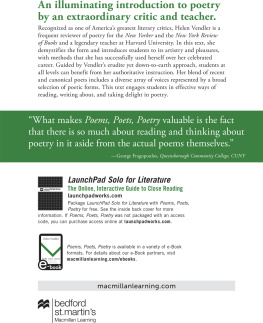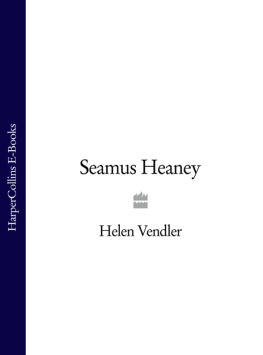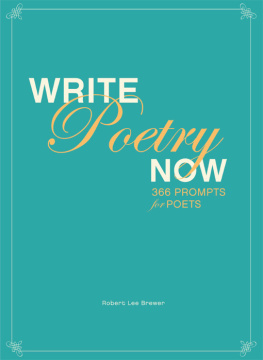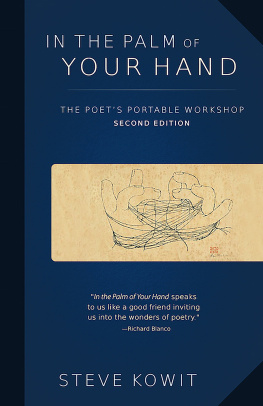Contents

An illuminating introduction to poetry by an extraordinary critic and teacher.
Recognized as one of Americas greatest literary critics, Helen Vendler is a frequent reviewer of poetry for the New Yorker and the New York Review of Books and a legendary teacher at Harvard University. In this text, she demystifies the form and introduces students to its artistry and pleasures, with methods that she has successfully used herself over her celebrated career. Guided by Vendlers erudite yet down-to-earth approach, students at all levels can benefit from her authoritative instruction. Her blend of recent and canonical poets includes a diverse array of voices represented by a broad selection of poetic forms. This text engages students in effective ways of reading, writing about, and taking delight in poetry.
What makes Poems, Poets, Poetry valuable is the fact that there is so much about reading and thinking about poetry in it aside from the actual poems themselves.
George Fragopoulos, Queensborough Community College, CUNY
LaunchPad Solo for Literature
The Online, Interactive Guide to Close Reading
launchpadworks.com
Package LaunchPad Solo for Literature with Poems, Poets, Poetry for free. See the inside back cover for more information. If Poems, Poets, Poetry was not packaged with an access code, you can purchase access online at launchpadworks.com.
Poems, Poets, Poetry is available in a variety of e-Book formats. For details about our e-Book partners, visit macmillanlearning.com/ebooks.
macmillanlearning.com
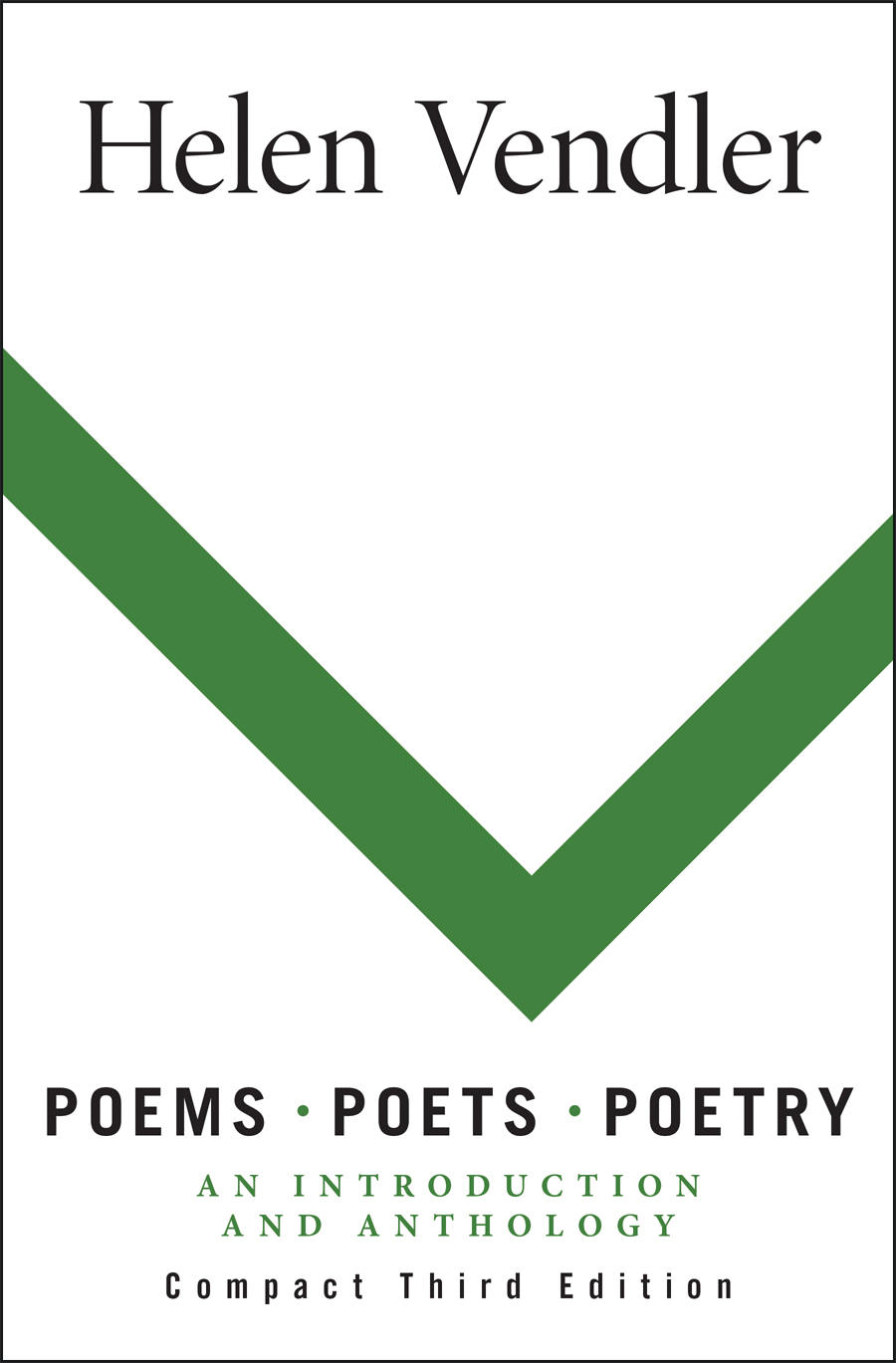
POEMS, POETS, POETRY
An Introduction and Anthology
COMPACT THIRD EDITION
Helen Vendler
HARVARD UNIVERSITY

For Bedford/St. Martins
Vice President, Editorial, Macmillan Learning Humanities: Edwin Hill
Senior Program Director for English: Leasa Burton
Program Manager: John E. Sullivan III
Assistant Marketing Manager: Sophia LaTorre-Zengierski
Director of Content Development: Jane Knetzger
Executive Development Manager: Maura Shea
Senior Content Project Manager: Peter Jacoby
Senior Workflow Manager: Jennifer Wetzel
Production Supervisor: Brianna Lester
Media Project Manager: Angela Beckett
Editorial Services: Lumina Datamatics, Inc.
Composition: Lumina Datamatics, Inc.
Permissions Editor: Arthur Johnson
Senior Art Director: Anna Palchik
Text Design: Anna George
Cover Design: William Boardman
Copyright 2018, 2010, 2002, 1997 by Bedford/St. Martins.
All rights reserved. No part of this book may be reproduced, stored in a retrieval system, or transmitted in any form or by any means, electronic, mechanical, photocopying, recording, or otherwise, except as may be expressly permitted by the applicable copyright statutes or in writing by the Publisher.
2 1 0 9 8 7
f e d c b a
ISBN 978-1-319-10791-8 (EPUB)
Acknowledgments
Text acknowledgments and copyrights appear at the back of the book on , which constitute an extension of the copyright page.
Preface: About This Book
About the Compact Third Edition
The publisher tells me that since the third edition of Poems, Poets, Poetry was published several years ago, poetry teachers have moved away from assigning books that their students deem too ample and too expensive. This compact version of the third edition addresses those student concerns while retaining all the pedagogy and poetry that instructors have said they value most in the third edition.
About Poems, Poets, Poetry
This book offers ways to read and understand poems with the pleasure they deserve. The eleven chapters in , The Play of Language, suggest some useful ways of describing poems by the class of poems to which they belong, by the little plots they act out through grammar and syntax, by the speech acts in which they engage, by the agents the poets choose to do the work of the poem, and so on.
, Attitudes, Values, Judgments, the largest questions we can put to a literary work fundamentally, questions of ethical value are raised and discussed with respect to some crucial examples, old and new.
Each of the first nine chapters takes up several poems by way of illustration, and each ends with a section called Reading Other Poems that introduces a small group of poems that can be usefully read in the light of that chapter. These poems are usually short and range from the canonical to the recent.
The final two chapters of , Studying Groups of Poems, is divided into two parts: the first examines a suite of poems by Walt Whitman commemorating Abraham Lincoln, and the second probes the theme of time in several Emily Dickinson poems.
s anthology provides a sampling from the literature of lyric by more than 78 poets, arranged alphabetically by author. Reviewers who taught from the third edition indicated that these retained poems were the ones they assigned most frequently. Finally, my appendices on prosody, grammar, speech acts, rhetorical devices, and lyric subgenres provide further illustration of points taken up substantively but not exhaustively in individual chapters. They can help consolidate and extend when assigned as home reading the demonstrations given in class.
Starting with the second edition, I assented to a few changes in the format of the book. In the first edition, none of the poems had their lines numbered. Poets tend to conceive of their poems stanzaically, not line by line, and they prefer that their poems not be encumbered by elements (such as line numbers) that they themselves have not introduced. Therefore, my own classroom preference is to specify by referring to stanzas and page numbers. (Look at the third stanza on .) But many instructors pointed out how difficult it is to talk about long poems such as T. S. Eliots The Love Song of J. Alfred Prufrock without some minimal line numbering to help navigate the turns of the discussion. In deference to them, every fifth line in poems of more than 50 lines is now numbered (unless the stanzas in those longer poems are already numbered see, for example, William Wordsworths Ode: Intimations of Immortality).
Finally, I have indicated the poets birth and death dates in the text so that readers will have a broad sense of when the poems were written and which poets were contemporaries who might have read whom, and when.
AUTHORS NOTES FOR TEACHING POEMS, POETS, POETRY: I have prepared a brief instructors manual, available for download from the books catalog page at that are not discussed in the texts first nine chapters.
Acknowledgments
Id like to thank once more all the reviewers who helped shape earlier editions by their detailed and incisive suggestions, among them Charles Altieri, University of California at Berkeley; David Bruzina, Ohio University; Robert Chodat, Boston University; Paul Dolan, Boston University; Andrew DuBois, University of Toronto at Scarborough; Paul Fry, Yale University; Matthew Hartman, Ball State University; Ann R. Hawkins, Texas Tech University; Michael S. Holko, Texas Tech University; Vincent B. Leitch, Purdue University; James Maynard, State University of New York at Buffalo; Jeredith Merrin, Ohio State University; Steven Monte, College of Staten Island; Robert Phillips, University of Houston; Rowan Ricardo Phillips, State University of New York at Stony Brook; Susan Schweik, University of California at Berkeley; Paul Sofield, Amherst College; George Stade, Columbia University; Maxine Weaver, Florida Atlantic University; and Camille-Yvette Welsch, Pennsylvania State University.

